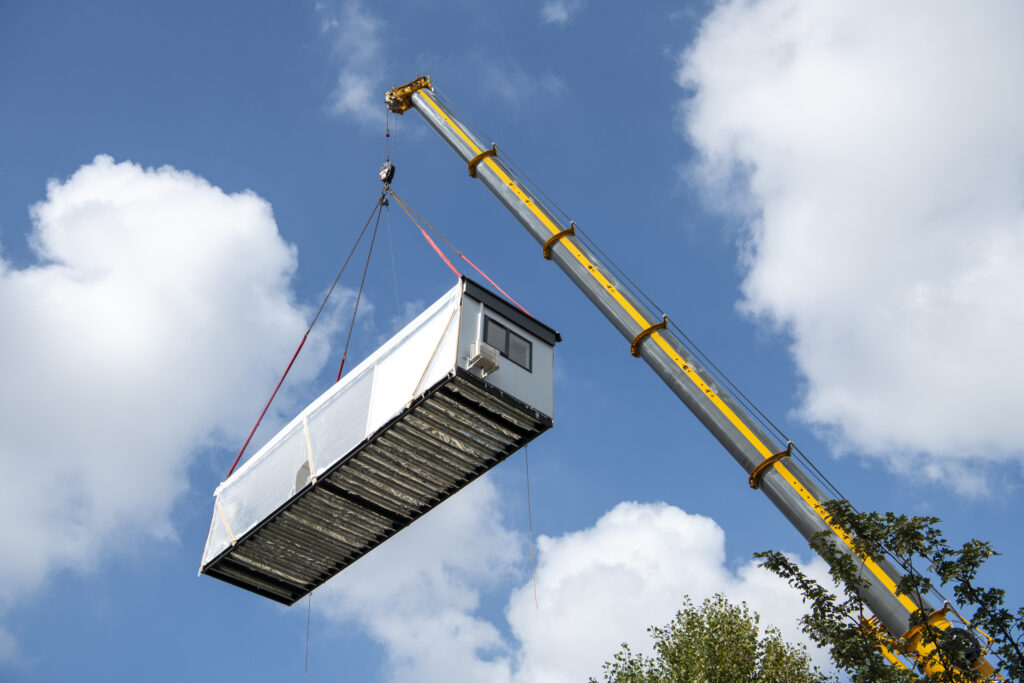Environmental responsibility and sustainable practices are at the top of everyone’s agenda these days, ranging from governments, multinational corporations and small businesses all the way down to schools, communities and individual households. As a result, construction is a sector where sustainability is very much a priority, which is one of the reasons why modular buildings are increasingly common and being used for a wide range of applications, including offices, marketing suites, classrooms, healthcare facilities, and so much more.
In this blog we’ll explore how modular buildings are spearheading sustainability efforts across various sectors and revolutionising the way organisations can build a greener future together.
Sustainable design principles
Modular construction embraces sustainable design principles from inception to completion. By prioritising efficient use of space, materials and resources, modular buildings minimise waste and environmental impact from day one.
The modular design process emphasises optimisation and standardisation, leading to streamlined production workflows and reduced material consumption. Once installed, modular buildings remain inherently adaptable, allowing for further expansion, repurposing and reconfiguration, which greatly extends the lifespan of the structure and prevents it from being neglected in the future.
Resource-efficient manufacturing
One of the key advantages of modular construction is its off-site manufacturing process, which enhances resource efficiency and reduces the environmental footprint. In a controlled factory environment, modular components are precision-engineered and assembled using advanced manufacturing techniques. This approach keeps waste as low as possible, as excess materials can be either recycled or reused in subsequent projects. These centralised manufacturing facilities also enable economies of scale and resource optimisation, resulting in more sustainable production practices compared to traditional on-site construction methods.
Energy-efficient building systems
All of our modular buildings incorporate energy-efficient building systems and sustainable technologies, which minimise energy consumption and promote environmental responsibility. From passive design strategies such as orientation, insulation and natural ventilation to active systems like energy-efficient lighting and HVAC (heating, ventilation and air conditioning), modular construction facilitates reduced energy usage throughout the building’s lifecycle.
On top of this, you have the freedom to equip your modular buildings with renewable energy solutions such as solar panels, wind turbines and geothermal systems as part of your wider environmental strategy. This will further reduce your reliance on fossil fuels and the national grid, significantly lowering your carbon emissions.
Sustainable materials
Modular construction focuses on sustainable materials and construction practices to mitigate environmental impact and promote eco-friendly building solutions. Manufacturers prioritise the use of recycled, recyclable and low-impact materials wherever possible, including certified wood, eco-friendly insulation and non-toxic finishes.
Another factor is that modular construction reduces local disturbance and environmental disruption during the on-site installation phase, which helps to preserve natural habitats, ecosystems and biodiversity.

Reduced carbon footprint and emissions
The streamlined manufacturing and transportation processes associated with modular buildings contribute to a significantly reduced carbon footprint compared to traditional building methods. By consolidating production activities in centralised factories and optimising transportation logistics, modular buildings minimise energy consumption and greenhouse gas emissions associated with material sourcing, fabrication and delivery.
What’s more, the energy-efficient design and operation of modular buildings result in lower operational carbon emissions over their lifespan, making them a sustainable choice for environmentally conscious developers, businesses, educational institutions, healthcare facilities and not-for-profit organisations.
Resilience to climate change
Modern modular buildings are built to be strong and robust, making them capable of dealing with the challenges posed by climate change. Modular structures can be engineered to withstand extreme weather events, seismic activity and other environmental challenges, ensuring occupant safety and structural integrity in adverse conditions. This offers complete peace of mind, as it means that our modular buildings are built to last and can be relied on for many, many years to come.
Social and economic benefits
In addition to environmental benefits, modular construction delivers social and economic advantages that contribute to sustainable development. By accelerating project timelines and reducing construction costs, modular buildings offer affordable community facilities and infrastructure projects that address social equity and urban development challenges.
In the process, modular construction creates job opportunities in manufacturing, assembly and skilled trades, supporting local economies and fostering workforce development in sustainable construction practices.
A sustainable construction route
Numerous case studies and success stories demonstrate the transformative impact of modular construction on sustainability across various sectors. From affordable retail units and educational facilities to healthcare centres and commercial buildings, modular construction has proven its effectiveness in delivering high-performance, energy-efficient structures that meet the needs of diverse stakeholders, all while advancing their sustainability goals.
To sum up
It’s safe to say that modular buildings are pioneering sustainability in construction by embodying principles of efficiency, versatility and resilience. Through innovative design, resource-efficient manufacturing, energy-efficient systems and sustainable materials, modular construction offers a compelling solution for addressing the environmental, social and economic challenges of the 21st century. As the demand for sustainable building solutions continues to grow, modular construction is proudly leading the way towards a more sustainable, adaptable and welcoming built environment for generations to come.
Explore our finance options
If you’re interested in modular buildings on any scale as a means of expanding your premises and meeting increased demand, GCS Cabins offers finance options that protect cash flow and further speed up implementation. All of our modular buildings can be purchased in monthly instalments, making them a highly cost-effective solution whenever you need to expand or upgrade your premises. Take a look at our finance calculator to find out more.
Create a more sustainable future with GCS Cabins
GCS Cabins has been supplying the highest quality of modular buildings and modular classrooms to businesses and organisations around the UK since 2007. To find out more, contact us today and have a chat with our team about how we can support you in achieving your unique goals.






